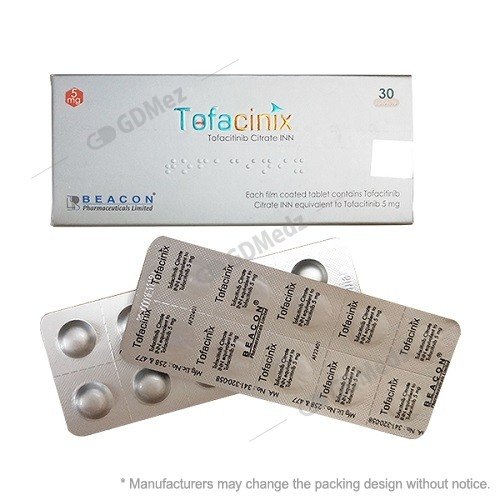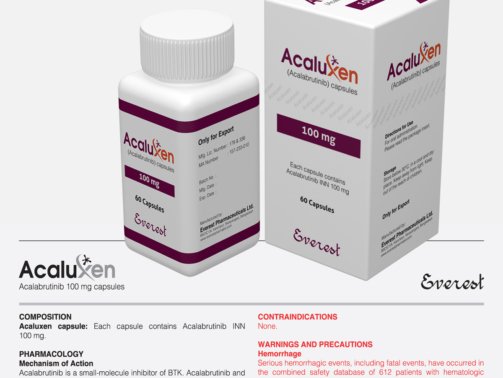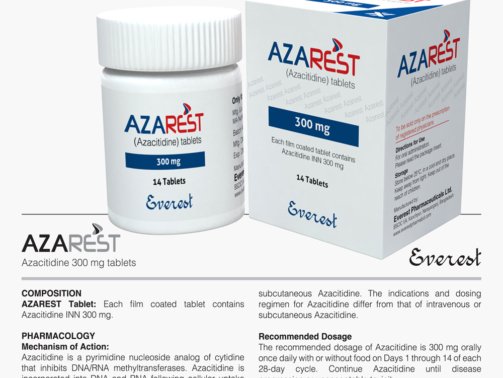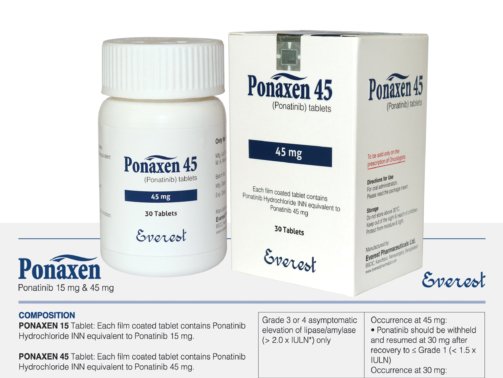Tofacitinib 5 mg (Xeljanz)
0.00$
Tofacinix 5 mg is prescribed for adults with moderately to severely active rheumatoid arthritis who haven’t responded well to or cannot tolerate methotrexate. It can be used alone or with methotrexate or other nonbiologic disease-modifying antirheumatic drugs (DMARDs).
Under the brand name Xeljanz, tofacitinib is a prescription drug that is a member of the Janus kinase (JAK) inhibitor pharmacological class. By adjusting the immune system’s reaction, it is mostly used to treat inflammatory and autoimmune diseases. There are several strengths of tofacitinib, however one of the most often given dosages is the 5 mg pill.
Uses
A number of chronic inflammatory illnesses can be treated with tofacitinib 5 mg, including:
Adults with moderate to severe active rheumatoid arthritis (RA) who have not responded well to methotrexate or who are intolerant of it should use this medication.
Adults with active psoriatic arthritis (PsA) who have not reacted well to conventional disease-modifying antirheumatic medications (DMARDs) are treated with this medication.
Adults with moderately to highly active ulcerative colitis (UC) who do not respond to tumor necrosis factor (TNF) blockers are prescribed this medication.
Juvenile Idiopathic Arthritis (JIA): For kids with active polyarticular JIA who are two years of age or older.
Tofacitinib improves joint pain, edema, stiffness, and general physical function by decreasing inflammation and delaying the course of the disease.
Mechanism of Action
Tofacitinib works by selectively inhibiting Janus kinase enzymes (mainly JAK1 and JAK3), which are involved in the signaling pathways that regulate immune function and inflammation. By blocking these enzymes, tofacitinib reduces the activity of immune cells that contribute to autoimmune diseases.
This inhibition helps to:
Decrease inflammation.
Reduce immune system overactivity.
Prevent joint and tissue damage.
Dosage and Administration
Tofacitinib 5 mg is taken orally, typically once or twice daily, depending on the condition being treated and the patient’s response to therapy.
Rheumatoid and Psoriatic Arthritis:
5 mg taken twice daily or 11 mg extended-release once daily.
Ulcerative Colitis:
10 mg twice a day for up to eight weeks is the induction dosage.
Maintenance: 5 mg or 10 mg twice daily, depending on patient response.
The tablets should be taken with or without food, and patients should follow their doctor’s specific instructions. Dose adjustments may be needed in cases of liver or kidney impairment, or when taken with certain other medications.
Possible Side Effects
Like all medications, tofacitinib may cause side effects. Some are mild, while others require medical attention.
Common side effects:
A headache
Having diarrhea
congestion of the nose
elevated blood pressure
elevated levels of cholesterol
Serious adverse effects:
An elevated risk of severe infections, such as pneumonia and TB
thrombi in the legs or lungs
Abnormalities of liver enzymes
Cancer, including skin cancer and lymphoma
Digestive perforations
Blood counts, cholesterol levels, liver function, and infections should all be routinely checked on patients.
Warnings and Precautions
Tofacitinib 5 mg (Xeljanz) carries boxed warnings from the U.S. FDA due to its risk of serious side effects:
Infections:
The body’s capacity to fight infections may be diminished by tofacitinib. Patients should be screened for tuberculosis and other infections before starting therapy.
Malignancies:
Some types of cancer are more likely to occur. It is recommended to get regular skin examinations and cancer tests.
Cardiovascular Risks:
The drug may increase the risk of heart attack, stroke, and death, especially in patients over 50 with cardiovascular risk factors.
Thrombosis:
Higher dosages are linked to a higher risk of blood clots. Patients should report symptoms such as chest pain, shortness of breath, or leg swelling immediately.
Drug Interactions
A number of additional drugs may interact with tofacitinib:
Its levels can be raised by potent CYP3A4 inhibitors (like ketoconazole), necessitating a dose reduction.
Rifampin is one example of a CYP3A4 inducer that can reduce its efficacy.
When combined, immunosuppressants such as cyclosporine or azathioprine may raise the risk of infection.
All medications, including over-the-counter pharmaceuticals and supplements, should be disclosed to the patient’s healthcare provider.
Use during lactation and pregnancy
Pregnancy:
Tofacitinib should be used during pregnancy only if the potential benefit justifies the potential risk. Animal studies have shown adverse fetal effects.
Lactation:
The excretion of tofacitinib in human milk is unknown. Caution is advised.
Storage and Handling
Keep the 5 mg tablets of tofacitinib at room temperature (20°C to 25°C, 68°F to 77°F). Keep out of children’s reach and away from heat and moisture.
Conclusion
For a number of autoimmune diseases, tofacitinib 5 mg (Xeljanz) is a potent and successful medication, particularly when previous treatments have failed. Although it has a lot to offer in terms of reducing chronic inflammation and enhancing quality of life, its usage needs to be closely monitored because it can have major negative consequences. To guarantee the drug is used safely and effectively, patients should collaborate closely with their healthcare professionals.
Order Now At Mdx Pharma bd….
To order from MDX Pharma BD, visit their website at https://mdxpharmabd.com, where you can browse products and place orders online. For inquiries or orders via email, contact emedicarepharma@gmail.com. Alternatively, call (+88) 01929123476. Their address is 29, Abdullahpur, Uttara, Dhaka-1230, Bangladesh.
1. What is the purpose of tofacitinib (Xeljanz)?
In response, tofacitinib is used to treat autoimmune diseases like:
RA, or rheumatoid arthritis
(PsA) psoriatic arthritis
UC, or ulcerative colitis
By focusing on the Janus kinase (JAK) enzymes involved in the immunological response, it helps control symptoms and lessen inflammation.
2. Tofacitinib: How does it work?
Tofacitinib functions by blocking JAK enzymes, which are part of the signaling cascades that cause inflammation. The medication lowers immune system activity by blocking these pathways, which aids in the management of inflammatory diseases.
3. What is the typical tofacitinib dosage?
In response, the usual dosage is:
For psoriatic and rheumatoid arthritis, take 5 mg twice a day.
For ulcerative colitis, take 10 mg twice a day for induction and 5 mg twice a day for maintenance.
Depending on the patient’s reaction and the situation, the dosage may change.
4. Is tofacitinib safe to consume while nursing or pregnant?
It is not advised to take tofacitinib when pregnant or nursing. It could hurt the fetus. Effective contraception should be used both during and for a period after therapy for women of reproductive potential.
5. Can I abruptly stop taking tofacitinib?
Tofacitinib shouldn’t be stopped suddenly without first consulting a doctor. Stopping abruptly could make your problem worse. If necessary, discuss tapering or transitioning with your physician.
| Product Name | Tofacinix |
|---|---|
| Generic Name | Tofacitinib |
| Formulation | Tablet |
| Available Pack Size | 3×10’s Alu-Alu |
| Available Strength | 5 mg |

 Cart is empty
Cart is empty 



